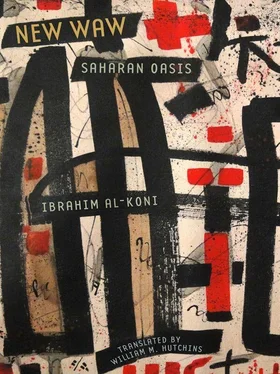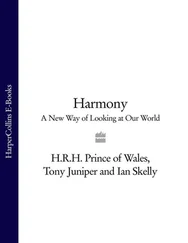5
The earth spoke to him.
The earth spoke to him; so he did not cast an eye toward the sky.
He had not gazed at the sky since he emerged from inside the tent and crawled across the earth to the distant pastures. On the trail to the pastures, he heard her speak for the first time. She spoke through the stone stelae. She spoke to him through the trunks of acacias enveloped in the evening’s gloom. She spoke to him through retem blossoms that bowl people over with their fragrance, which fills breasts with ecstasy, dizziness, and longing. She spoke to him through the summits of northern mountains that are clad in turbans of celestial fabric threaded with color from dawn’s firebrand. She spoke through grim expanses of the wasteland, which coaxes the wanderer till he yields, gives away everything, and advances when she leads him down the path to the Unknown, from which he never turns back. She spoke to him through the stillness of the nights, the empty expanses of which were dominated by flooding moonlight. She would humble herself, withdraw, and divest herself as if she were chief of all insouciant creatures.
She spoke to him in many tongues. Then he understood, and the mysterious firebrand overwhelmed him. He wept and prostrated himself, hearing nothing but her whispering and seeing nothing but her body since that day long ago.
After that, the sky fled from the sky and on earth only the earth remained.
6
Who had told him in times forgotten that the earth is the appropriate abode? Was it his father, whom he didn’t remember? Was it the tribe’s leader long ago? Was it the voice of the ancestors? Was it a messenger from the inhabitants of the Spirit World? Or, was it the earth herself who had communicated with a mysterious cry, confiding to him that she is a mother who must never be forsaken?
In that period — the days of childhood, play, and innocence — the earth was very close. He would crawl outside to play between the tent sites, plunge into her dirt and clay, and smear his face with her sand. He was only inches from her breast and stumbled on all fours across her palm. He would stand only to fall the next instant. When he pushed up even as high as a knuckle, he would be seized by fear — a nameless, noble fear imbued with a sense of danger. Was it the danger of falling? The danger of leaving never to return? The danger of the first step on the path to the labyrinth? Or, was it the enigmatic sensation of being on the verge of losing paradise and the voice of the herald crying that the time is nigh for a migration from which there is no return?
But the trip does not begin blindly, because the enigmatic desert does not allow its children to depart without instructions. The lesson begins with the first step. Then the little wanderer meets its prophecies in the plasticity of the clay he molds, in the scraggly plants the desert produces bountifully in rainy seasons, in the tiny grains it slips into the bread dough that its sands cook. Afterwards it leads him by the hand on another journey. It takes him on a tour of the grazing lands to teach him the trails that lead out of them. On the naked plains it lashes him with winds that strike the faces of wanderers with grit. Or, it frowns, glowers, and pours down a deluge of rain. Or, it exhales feverish fire in the seasons of the Qibli wind. Or, it unleashes cold in winter seasons. It employs many strategies to inform the young wanderer that the migratory route will be desolate and inescapable if he does not rely on her, if he is not guided by her, and if he does not remain loyal to her. So he realizes and learns from the first day that in this tenebrous, munificent terrain, which extends and renews itself forever, there is a secret he can never dispense with. In it lurks that cryptic amulet the traveler in the labyrinth can never do without.
7
When the messenger from the nobles arrived that evening, he was recalling his life story and hiding out in his cellar. He was recalling this amulet, because he — unlike the others — had never forgotten it. He hadn’t forgotten it, because the mother hadn’t shared it with him during that forgotten time of innocence when she had told the others. He hadn’t forgotten it because the earth screamed advice in his ear the way desert mothers normally scream the names of newborn babes in their ears. Perhaps for this reason he hadn’t followed the same path the others had in their migrations. The others had pursued the trail toward the horizon, whereas he had followed the trail leading to the depths. His mates had set out, like those before them, on the path of the extensive wasteland. He, on the other hand, had bowed his head, looked down into the belly, and established his dwelling inside its breast before building his vaults in the dirt, fleeing from the labyrinth of the expanse, while seeking protection with the mother from the ghoul of loss.
He was reliving his life when the messenger of the elders visited him.
He normally recalled that story every day — indeed, several times a day, because the mother to whose breast he had come for refuge would repeat her counsels to him, lest he forget, and deliver new instructions on each occasion. He would eavesdrop and hear this female diviner when she mocked her naughty children who had fled and raced into the wasteland, lured by the horizons. They capitulated, darted off, and then rolled around the way tumbleweed does when the wind drives it. They forgot the lower reaches just as quickly as they forgot her counsels. Then they considered vain locomotion to be a homeland, and the search scorched them with fires of longing. So they rushed off, and the fates of the primeval labyrinth changed into genuine and lethal loss.
Since he was listening carefully, he heard their footsteps from his shelter. They were pounding on the earth as if they wanted to harm it. They exaggerated their boorishness as if they deliberately wanted to cave the earth into the earth, without planning an escape route should the earth sink and flee from the earth. They were wandering aimlessly over her face like the hoi polloi, who don’t know what they are doing, don’t fathom where they are going, and don’t understand what they want.
He was hunkered down in the earth, hearing, listening, brooding, wondering, and becoming ever more certain that salvation is possible only through proceeding farther down the corridor and digging deeper into the belly of the earth.
They ridiculed his shelter, but their ridicule only made him more convinced. The female poets satirized him, but he laughed at their verses in his subterranean vaults and smiled from ear to ear. Once he committed an error. He chased after the beauty and had a child by her. But he decided to atone for his sin. So he taught the child the counsels of the lower reaches, of isolation, and of stillness. The baby was only calm when he brought him into the shelter and placed him as a pledge in the hand of the earth.
8
In the council he leaned forward over his homeland and read in its skin the dirt’s riddles. They told him they had dug, searched, and torn the body of the earth until they had despaired. They also said that they had finally learned that they would never find a way to water if he did not come to their aid. So would the son of the earth countenance the people of the earth or would he reject them and disappoint their request?
He leaned further forward. He bowed so low that his bent head touched his chest while his fingers continued to trace a sign in the earth’s book. He dug furrows with his forefinger and with all his fingers punched the tracks of various creatures: the pawing of a camel’s hoof, the imprint of a jackal, the trudging of dung beetles, and the twisting trail of the snake.
Aggulli said, “The well on the mountain slope destroyed us. We have excavated many summits without even reaching damp soil. What does this mean?”
Читать дальше












